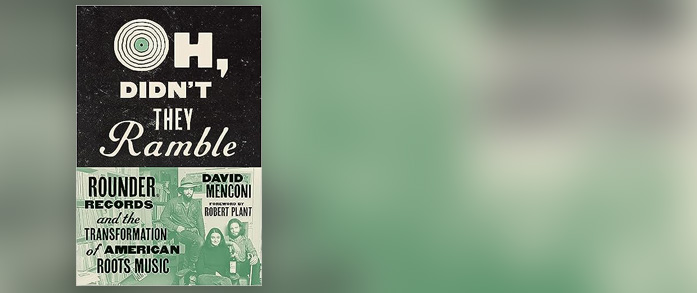Oh, Didn’t They Ramble: Rounder Records and the Transformation of American Roots Music, a book from David Menconi whose title perfectly describes its content, has been singled out for a Certificate of Merit by the Association for Recorded Sound Collections.
The book was awarded in the category for Excellence in Historical Sound Research in Record Labels or General Recording Topics. Rounder Records, of course, has been responsible for releasing music by some of the most popular artists in acoustic music, like Alison Krauss, Billy Strings, Rhonda Vincent, J.D. Crowe & The New South, Béla Fleck, Sierra Hull, Blue Highway, Russell Moore & IIIrd Tyme Out, and many, many others.
Menconi, a life-long music journalist, spent much of his career covering the North Carolina Piedmont’s rich music scene for Raleigh’s News & Observer. After retirement, he has had a number of full-length titles published by the University of North Carolina Press, on various music topics. But this one drew a great deal of attention, focusing as it does on the history of one of the most influential independent record labels in the US, and the three colorful characters who founded it.
As Richard Thompson shared in our review last year…
In a new book, Oh, Didn’t They Ramble: Rounder Records and the Transformation of American Roots Music, David Menconi traces the story of the legendary music label founded in 1970, beginning in the wake of the American folk revival and 1960s movement politics, formed around the eclectic tastes and audacious ideals of three then-recent college graduates who lived, listened, and worked together.
He draws on previously untapped archives and extensive interviews with artists, Rounder staff, and founders Ken Irwin, Marian Leighton Levy, and Bill Nowlin, who blended ingenuity and independence with serendipity and an unfailing belief in the ‘small-d’ democratic power of music to connect and inspire people, forging creative partnerships that resulted in one of the most eclectic and creative catalogs in the history of recorded music.
The book has been widely praised, but David told us today that an award of this kind from a recording industry association like ARSC is a particular treat.
“Recognition for one’s work is always wonderful, especially in a field this strong. Every other book in this category was amazing, and I’m beyond honored at this. Massive appreciation to The Association for Recorded Sound Collections!”
Congratulations to David Menconi, the University of North Carolina Press, and Rounder Records at the announcement of this honor.
Oh, Didn’t They Ramble is available directly from the publisher in either hardback or e-book formats, from a variety of online booksellers, and for multiple digital readers.
